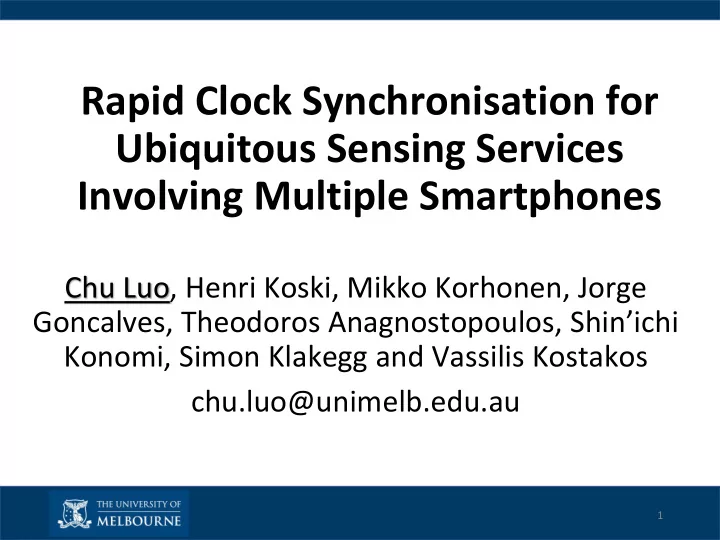

Rapid Clock Synchronisation for Ubiquitous Sensing Services Involving Multiple Smartphones Chu Luo, Henri Koski, Mikko Korhonen, Jorge Goncalves, Theodoros Anagnostopoulos, Shin’ichi Konomi, Simon Klakegg and Vassilis Kostakos chu.luo@unimelb.edu.au 1
Smartphone Sensors and Apps http://funf.org/about.html
Sensing with Multiple Phones
Phone Clock Has Drift
Challenge: To synchronise clock on phones
Related Work Clock Synchronisation: 1. Network Time Protocol (NTP) 2. Precision Time Protocol (PTP) 3. GPS Clock Synchronisation
Network Time Protocol (NTP) A stratum model http://www.meinberg.in/support/information/ntp-the- network-time-protocol.htm
Network Time Protocol (NTP)
NTP can be inaccurate: Server Time NTP Actual Trips Client Time NTP Error
To make use of NTP Collect many samples, do: 1. Linear Programming; or 2. Linear Regression(fitting) Error can be minimised:10-100 ms 10
Precision Time Protocol (PTP) A specialised network http://www.meinberg.in/support/information/ntp-the- network-time-protocol.htm
GPS http://geospatialrevolution.psu.edu/educators/trilateratio n.html
NTP as the base for ubi-sensing Reasons: 1. Available anywhere on Internet 2. PTP needs LAN infrastructure 3. GPS is restricted by signals, power- hungry and hurts location privacy. 13
Phone Clock Drift How large can this drift be? 14
Study 1 Running for 9 days: 1. 3 identical phones 2. Connected to WiFi 3. Collecting NTP sample per minute 15
16
Rapid Clock Synchronisation Using the median of several NTP Samples 17
18
19
Study 2: measure pair-wise synchronisation difference http://leacellodp.weebly.com/roller-coaster-project.html 20
Difference of sync using 10 samples 21
Take-away Points 1. Clock drift may be 150ms per day 2. NTP is most available and flexible 3. Using NTP median is a rapid way: a) Mean accuracy 12ms, 10 samples b) Worse case, <100ms, 97 samples <40ms, 157 samples
Rapid Clock Synchronisation for Ubiquitous Sensing Services Involving Multiple Smartphones Chu Luo, Henri Koski, Mikko Korhonen, Jorge Goncalves, Theodoros Anagnostopoulos, Shin’Ichi Konomi, Simon Klakegg and Vassilis Kostakos. chu.luo@unimelb.edu.au 23
Recommend
More recommend